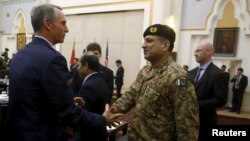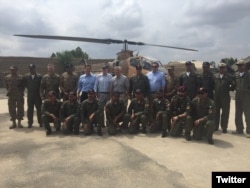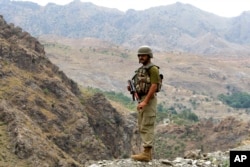Pakistani policy makers and legislators stand “puzzled” over the way the United States has lately conducted its relationship with Islamabad and “extremely opposing views” emanating from within the U.S. Congress about Pakistani counterterrorism and efforts to promote peace in Afghanistan.
Pakistan and the United States have long had uneasy relations. Ties have been strained recently over allegations that Pakistan’s counterterrorism operations focus only on militants linked to the anti-state Pakistani Taliban, and spare sanctuaries linked to Afghan militants, including the Haqqani Network terrorist group.
US Congressional hearing
Recently, the U.S Congress stopped the Obama administration from subsidizing the sale of eight F-16 fighter planes to Pakistan, citing lack of cooperation in combating terrorist networks.
Pakistani officials are particularly furious at a Congressional hearing last week in Washington under the title “Pakistan: Friend or foe”.
Some lawmakers and witnesses during the proceedings of a sub-panel of the House Foreign Affairs Committee demand Washington cut off financial and military aid to Islamabad, accusing the Pakistan military of maintaining ties to Taliban and Haqqani militants fighting the U.S.-backed Afghan government.
They even recommended Pakistan be internationally isolated and declared a state sponsor of terrorism.
Senior Pakistani officials, however, have belittled the Congressional hearing and dismissed anti-Pakistan assertions as “baseless concerns” of a section of U.S lawmakers.
“The hearing you have referred to was informal and was very thinly attended. Mr. Ted Poe, who was behind the idea of hearing, himself did not attend it. His negative bias against Pakistan is well known, so nothing positive could be expected,” asserted foreign ministry spokesman Mohammad Nafees Zakaria.
From the Pakistan-U.S. common perspective, he added, the two countries are “long time partners and allies in their shared goal of defeating terrorism” and have been cooperating in the anti-terror fight.
Owais Leghari, chairman of the parliamentary committee on foreign affairs, asserts that Pakistan is being increasingly blamed and turned into a “punching bag” because of setbacks the U.S. policy in Afghanistan has suffered.
“I think these Congressional hearings are just ways to keep Pakistan under pressure, which are not helping the U.S. image in Pakistan at the grass root level,” noted the ruling party lawmaker.
“Pakistan needs to clear its soil of any terrorists that we have, and we have been able to do a much better job than all the global community put together in Afghanistan,” noted Leghari.
He echoed views that members of a bipartisan Congressional delegation expressed after visiting Pakistan and Afghanistan earlier this month under the leadership of Republican Senator John McCain.
The influential Congressmen held comprehensive talks with Pakistan Army Chief General Raheel Sharif before they were flown in a military helicopter to North Waziristan, a tribal territory on the Afghan border that until recently was condemned as the “epicenter” of international terrorism and a source of fueling the Taliban-led insurgency.
“They have cleared out that part of Pakistan... they are looking at securing the Pakistan border in a more substantial way. So, I want to help Pakistan, and they are doing the right thing and there is a lot of improvement to be made. But I would acknowledge it a step in the right direction,” noted U.S. Senator Lindsey Graham.
Pakistan has lately taken new measures to strengthen security along its 2,600-kilometer border with Afghanistan, including construction of new check posts at eight established crossing routes, saying it would help counter terrorist movement on either side. The project, however has enraged Afghan authorities who dispute the border being an international frontier.
But Pakistani officials dismiss the objections and say the construction of new facilities, including the main Torkham crossing, is progressing at a fast pace.
Some progress
Senator Graham also praised General Sharif, saying he has “set a new attitude” in the counterterrorism campaign and it is “beginning to show some progress.” Graham also disclosed the Pakistani general is opposed to any abrupt withdrawal of U.S. troops from Afghanistan.
“The Chief of Staff of the Pakistani Army says ‘I hope you leave your troops here, he told us that, because if you withdraw too quickly the place is going to fall apart and it will hurt us [Pakistan],” he said.
This contradicts concerns often expressed in Kabul and echoed during Tuesday’s Congressional hearing that Islamabad is supporting the Taliban, believing that continuing the war in Afghanistan will lead to a U.S. withdrawal and a collapse of the current Afghan government to set the stage for the Islamist insurgency to return to power.
“We emphasized the importance, that we felt, of good relations between the United States and Pakistan, Pakistan and Afghanistan. We also emphasized the need for progress in combating the Haqqani Network, which to a large degree is unmolested, enabling them to orchestrate attacks into Afghanistan,” observed Senator McCain.
Despite skepticism and differences plaguing bilateral ties, officials and analysts in Islamabad appear confident Washington would desist from adopting any punitive policies towards Pakistan. The confidence, they say, stems from the country’s growing closer economic and political ties with China.
“It is profitable for both the U.S. and Pakistan to maintain a manageable relationship despite their differences. In fact, the more pressure is on Pakistan, the closer China would be to Pakistan,” says Masood Khan, head of Islamabad’s Institute of Strategic Studies.


